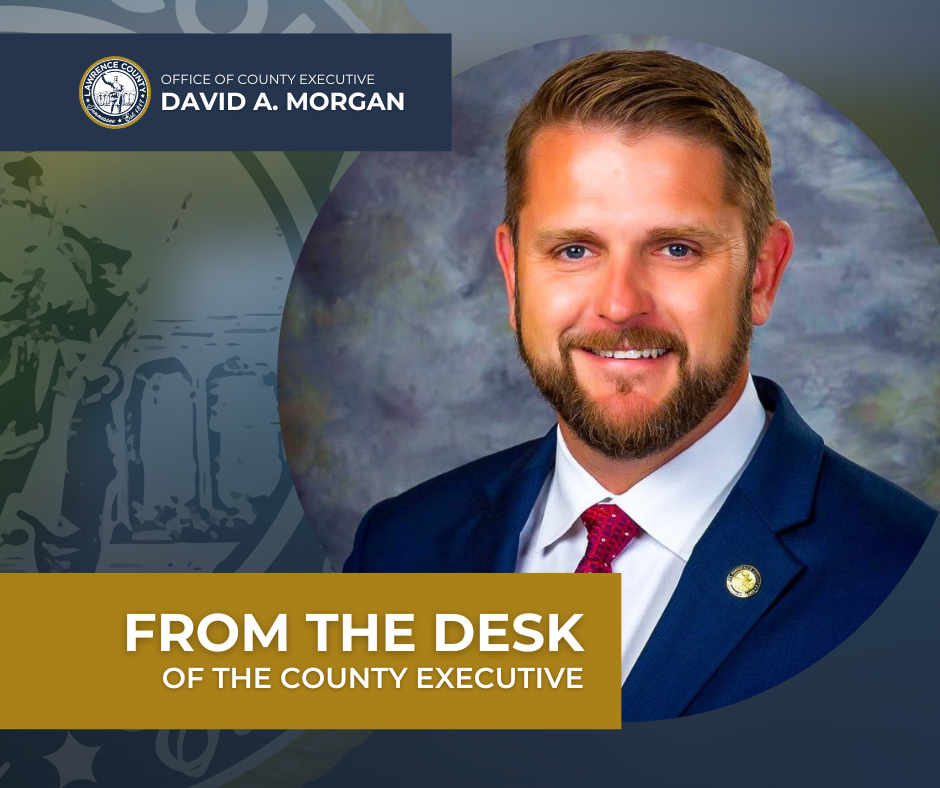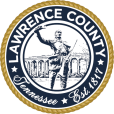Today I hope to inspire Lawrence County nonprofits to expand their work against Substance Use Disorder (SUD) with a local Opioid Abatement Grant.
A link to the application is available on our website, LawrenceCountyTN.gov, in an article about the grant under the “News” category. I urge you to start now because the application, developed by the UT Institute of Public Service’s Substance Misuse and Addiction Resource for Tennessee (SMART) Initiative, will take time to complete. It is due December 2.

How can Lawrence County give grants to nonprofits? Tennessee and other states are receiving a share of nearly $50 billion from lawsuits against opioid manufacturers, distributors, and pharmacies. The General Assembly established Tennessee’s Opioid Abatement Council to decide how to best spend those dollars, and it distributes 35% of those proceeds to Tennessee counties.
Annual payments to counties and cities of 50,000+ are based on the impact of opioids on their citizens, and payments to Lawrence County that began in 2022 have been slightly over $200,000 per year. The annual amounts will vary, but we definitely have funds available for organizations with the ability to carry out the projects they propose.
Grants are available to help nonprofits in six categories of response to Lawrence County’s opioid crisis. The percentage of total funding dedicated to each category is based on guidelines from the state.
Treatment – Projects would expand treatment of Opioid Use Disorder (OUD) and co-occurring substance use disorders or mental health conditions.
Examples include medication-assisted treatment, workforce development for addiction professionals, and access to telehealth services for treatment and counseling.
Recovery Support – Providing assistance such as housing, transportation, education, job placement, job training, or childcare for people in recovery.
Primary Prevention – Efforts that prevent over-prescribing and ensure appropriate prescribing of opioids. This can include support for non-opioid pain treatment alternatives, greater access to mental health services and supports for young people, and media campaigns to prevent opioid misuse.
Education & Training – Support for programs that educate health care providers, first responders, parents, youth, teachers and school staff, behavioral health workers, faith communities, and/or the public at large.
Harm Reduction – This includes efforts to increase the availability and distribution of naloxone and other drugs that treat overdoses to first responders, schools, individuals with OUD, their friends and family members.
Research & Evaluation – Support for research on topics including novel harm reduction and prevention efforts, non-opioid treatment of chronic pain, and reduction of misuse within criminal justice populations.
The Lawrence County Opioid Abatement Council will review applications and determine awards. I am honored to chair the Council, which is made up of people who, like me, have a passion for helping people find freedom from substance use disorder.
Members were approved by the County Commission and include:
Retired Circuit Court Judge David Allen, who served as the first Recovery Court Judge in the 22nd Judicial District. The District’s Recovery Court program started in Lawrence County.
Circuit Court Judge Chris Sockwell, who became the District’s Recovery Court Judge following Allen’s retirement.
Lawrenceburg dentist John M. Beasley, who has been Chairman of the Lawrence County Substance Abuse Prevention Coalition (LCSAP) since it was formed in 2018.
Lawrence County Schools’ Supervisor for Coordinated School Health Jenny Golden, who has worked in health and wellness for 24 years. She was the first Director of LCSAP.
Contractor Brandon Keeton, the Men’s Living Free program coordinator for United Church and vice-chairman for 8 Oaks Recovery. Brandon escaped the bonds of substance use disorder and is dedicated to helping others do the same.
Lawrence County Sheriff John Myers, whose career in law enforcement began in the early 1990s and includes work with the Judicial Drug Task Force Anti-Narcotics Unit. He witnesses firsthand the impact narcotics (both prescription and illegal) have on our community.
Licensed Clinical Social Worker Patsy Odom, who has worked as a mental health provider with Centerstone, Lawrence County Schools, A Kid’s Place, and in private practice. She is currently the Director of Clinical Services and treating therapist with 8 Oaks Recovery Center.
The opportunity to apply for a local opioid abatement grant will be offered each year.
***********************************************************************
In 2019, six in ten people in Lawrence County had an opioid prescription.
***********************************************************************
DUE TO MISLEADING AND AGGRESSIVE MARKETING by Purdue Pharma and other drug manufacturers that opioids such as OxyContin were non-addictive, physicians across the country began dramatically overprescribing opioids.
This caused widespread prescription opioid misuse among patients, wherein people were improperly sharing prescriptions. In the early 2010s, over 60% of people with a known history of opioid prescription misuse reported obtaining their first dose from a friend or family member either for free or for a price.
When acquiring the quantity of opioids to sustain a habit or addiction became more difficult, users began to substitute other, more dangerous substances such as heroin and fentanyl. Although prescribing decreased, overdoses and diagnoses of neonatal abstinence syndrome began to increase.
By 2012, opioids had overtaken alcohol as the primary substance of dependence among those receiving treatment funded by the Tennessee Department of Mental Health and Substance Abuse Services, while drug overdose deaths increased 220% from 1999.
The economic costs of Substance Use Disorder (SUD) in Tennessee are billions of dollars per year. Research from UT indicates a 10% decrease in prescription opioid abuse would lead to an increase in statewide personal income of $800 million.
Individuals with Opioid-involved SUD incur additional medical expenses of approximately $15,000 per person. At the statewide level, these additional health care costs are over $600 million.
After 2010, substitution from prescription opioids to uncontrolled substances, including fentanyl and heroin, led to increased incidences of child abuse. Each case carries a lifetime economic impact (to the child) of between $200,000 and $800,000.


